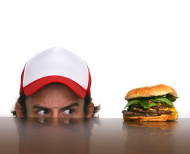 A few days ago I was walking out the door to go to work, and noticed the very last and very ripe banana in the fruit bowl that sits on the counter on the way out of the door in our kitchen. I like bananas, but really need to be in the mood for one. This is such a silly and repetitive dilemma I seem to encounter way too many times a month. Why do I buy so many bananas for just 2 people? I ask myself this every time I walk out the door and see those bananas going bad (yes, I can make banana bread, but I’m not a big fan of baking and without central air, it won’t be happening). Do I make myself take the banana just so that it won’t go bad, or do I follow my own advice and eat “intuitively” which means not forcing yourself to eat things you don’t really want (and also eating the things you really DO want!).
A few days ago I was walking out the door to go to work, and noticed the very last and very ripe banana in the fruit bowl that sits on the counter on the way out of the door in our kitchen. I like bananas, but really need to be in the mood for one. This is such a silly and repetitive dilemma I seem to encounter way too many times a month. Why do I buy so many bananas for just 2 people? I ask myself this every time I walk out the door and see those bananas going bad (yes, I can make banana bread, but I’m not a big fan of baking and without central air, it won’t be happening). Do I make myself take the banana just so that it won’t go bad, or do I follow my own advice and eat “intuitively” which means not forcing yourself to eat things you don’t really want (and also eating the things you really DO want!).
We all have to make decisions about what to eat every single day, and most of the patients I work with struggle with these decisions. They are torn by wanting to eat “healthy”, by having food “rules”, and by the “food police” in their brains screaming commands at every meal (“that’s bad! That has too much sugar! That has too many carbs!”). People who are dieting to lose weight especially have a hard time making food choices as well as tuning in to their hunger.
Then you have those of us who believe the repercussions of dieting and being too strict with eating usually backfire, trigger eating disorders, food obsession, or at the very least make life miserable (and boring). So we promote “intuitive eating” which means learning to “listen” to your hunger and fullness rather than relying totally on just your thinking (“cognitive” restraint). This approach to eating tends to promote feeling better both mentally and physically (related to no longer feeling starving, or not feeling overly stuffed).
Sounds simple, right? Well, as you probably know, it is not. Part of the reason is something called “hedonic hunger”. Hedonic hunger is “the appetitive drive to eat to obtain pleasure in the absence of an energy deficit”. In a paper written by Elizabeth Rose Didie in partial fulfillment of the requirements for the degree of Doctor of Philosophy at Drexel University in June of 2003 an instrument called the “Power of Food Scale (PFS)” was introduced. According to the paper, “the 21-item Power of Food Scale (PFS) was developed to assess the psychological influence of the mere presence or availability of food” (a self-report measure of hedonic hunger). It is suggested that a “preexisting vulnerability toward over-responsiveness to food” may exist for some people. In other words, some people may be more responsive to a food plentiful environment which makes “intuitive eating” more difficult. Not every person is the same when it comes to hunger. (if you are interested in the original research article, read it here: Power of Food Scale The actual questionnaire is on page 110).
Since the PFS was validated more research has been done looking into hedonic hunger and binge eating. There’s a lot more to learn, however just knowing that you are not like everyone else may be helpful. Instead of beating yourself up because you were not able to resist something, instead start to pay attention to your behavior. Try to accept what you discover (“if I bake cookies, I can’t help eating most of the batch”) and don’t berate yourself (which is what most people do, leading to even more bad feelings). Instead, you may want to consider only baking when you need to and go out for a few cookies at the bakery instead when you really want a cookie. Work to create a less triggering environment if you are one of those people who is more susceptible to hedonic hunger. Don’t set yourself up!
In the meantime, we all should be eating foods we really enjoy. You still can work on making healthy foods yummy, planning your meals and planning to have the foods you enjoy on a regular basis. It is ok to “use your head” when it comes to creating a healthy eating environment. Learn to cook and experiment with different healthy foods so that you always have meals you enjoy, yet continue to take care of your health. Cater to food cravings in a smart way (remember, if you see a food and then want it, it is not a real food craving, and more of a “beckoning” environmental trigger). When you are really in the mood for something, go buy it! If you want ice cream, go out and get a cone. This is way different than having large containers of ice cream in your home when you know you have trouble stopping, and end up feeling bad about yourself.
Yes, hedonic hunger makes it hard to eat intuitively, but with a little self-acceptance and smart choices, you can have your cake and eat it too. So what did I do with that banana?
I froze it.

That is me! If I get chips or crackers they will be gone in a few days. Peanut butter and jelly too. So I stopped getting those things for the most part 🙂
LikeLiked by 1 person
: ) Get a peanut butter and jelly sandwich for lunch at work!
LikeLike
Darn! I wish I had thought of freezing my overripe bananas!!
LikeLike